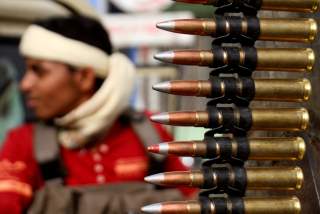Will Yemen's Houthis Stop Fighting in Exchange for a Political Victory?
The Houthis have suffered significant defeats on key battlefronts. Are they seeking a permanent political settlement?
Last Thursday, U.S. Defense Secretary James Mattis told Saudi Crown Prince Mohammed bin Salman (MBS) that both nations must “reinvigorate urgent efforts” to end the Yemen war. Mattis’s statement followed a meeting between MBS and President Trump. During that meeting both parties deemed that a “political resolution to the conflict” was necessary. There are two questions that remain amidst this push for peace. First, are the Houthis seeking a permanent political settlement? Secondly, if the Houthis are seeking a settlement, then will Iran agree to it?
MBS’s meetings with Trump and Mattis followed a flurry of diplomatic activity on the Houthis’ end. In January, Houthi spokesman Mohammed Abdul-Salam visited Oman, which is where he reportedly met with Saudi officials (shortly thereafter, Oman’s foreign minister flew to Tehran). In February, Abdul-Salam visited Iran and, just last week, he was reportedly seen in Saudi Arabia.
Sources are divided on the reason for Abdul-Salam’s Saudi trip; some say he is negotiating a temporary cease-fire for the Saudi-Yemen border (something he has done previously). Others report that the spokesperson is actively exploring a permanent political settlement to end Yemen’s three-and-a-half-year conflict. And yet, the Houthis marked the third anniversary of the conflict by firing seven missiles into Saudi Arabia on Sunday.
While the Houthis and their Iranian allies are sending mixed signals, it is clear that, over the past three months, the Houthis have suffered a series of political, economic and military setbacks that have weakened their position. Yemen could provide a test case to gauge Iran’s willingness to negotiate in good faith.
Politically, the Houthis’ decision to execute their ally, former president Ali Abdullah Saleh, last December left the organization virtually friendless. Saleh’s party, the General People’s Congress, provided the Houthis, a regional entity, with political cover and helped both entities claim that together they were acting as Yemen’s legitimate representatives. After Saleh’s death, much of the General People’s Congress defected, and those who remain Houthi allies carry little political gravitas. Consequently, to many Yemenis, the Houthis look increasingly like a sectarian entity that does not represent the interests of the Yemeni people.
Economically, the Houthis claim to be suffocated by the blockade, but they are having difficulty reconciling this position with an increasingly repressive taxation regime. The Houthis have instituted an ever-increasing “war tax,” on commodities, key staples, and imports. They have monopolized revenue from telecommunications, electricity, and other government services as well as businesses under their control. The revenues from these duties, as well as smuggling activity, go to support the Houthi war effort rather than toward essential public services, the provision of which has been outsourced to humanitarian agencies, fueling public discontent.
The Houthis have also recently suffered significant defeats on key battlefronts. Since their execution of Saleh last year, they have been forced to relinquish important territory in the Shabwa and Khokha provinces. Meanwhile, Yemen’s national army continues to advance on Taiz, the loss of which would sever the Houthis’ supply lines, leaving their forces in the capital of Sana’a vulnerable. A ferocious Houthi counterattack on Nehm was repelled, as were attempts to retake Sirwah, al-Jawf, and Hays. To compensate for an increasingly unsustainable casualty rate, the Houthis have accelerated the conscription of child soldiers.
Despite these setbacks, signals on peace are mixed. The Houthis continue to threaten civilian population centers in Saudi Arabia and the United Arab Emirates with missile strikes. And just last month, the UN envoy indicated the Houthis’ earlier rejection of a UN-sponsored agreement.
All that being said, supposing the Houthis are seeking an end to the conflict, would Iran allow them to negotiate in good faith?
Iranian support, in the form of guns, missiles, rockets, supplies, money, and training, is essential to the Houthis’ war effort. Sustaining the conflict costs Iran very little, while giving it a capable and ideologically aligned proxy that has captured another Arab capital. The Houthis also give the Iranians the means to strike directly at Riyadh and Abu Dhabi while maintaining deniability and forcing their two rivals to divert money, men, and resources toward protecting their own backyard. Houthi-appointed president Saleh al-Samad called Sunday’s missile strike a “message of peace;” in an ironic twist it is probable (if not provable) that Iran ordered this strike to remind Riyadh that its interests must be taken into account during negotiations.
And yet, in late February, Mohammed al-Houthi, a senior militia leader, submitted a peace plan to the United Nations following Abdul-Salam’s visit to the Iranian “mother ship.” Al-Houthi’s plan was nearly identical to an earlier proposal put forward by Iran’s foreign minister, Mohammad Javad Zarif.
Admittedly, both the al-Houthi and Zarif plans are vague and unbalanced. They call for ending the Arab-led coalition’s military operation but make no mention of the demobilization and disarmament of the Houthis nor commit Iran to ending its military support for their militias, conditions which Yemen’s internationally recognized government, its national army, and the Arab Coalition are likely to insist upon.
With hard-liners firmly in the driver’s seat in Tehran, Iran seemingly has little incentive to seriously negotiate over Yemen without securing substantial diplomatic gains elsewhere, such as in the Levant, in Iraq, on the nuclear agreement, or sanctions relief. Or they may simply be seeking to buy time for the Houthis to rearm and regroup.
That being said, with the Houthis increasing unpopularity and Iran facing mounting economic and political pressures at home, the al-Houthi and Zarif plans, while flawed, could also indicate a genuine willingness to negotiate an end to this destructive conflict. Yemen’s internationally-recognized government and the Arab-led coalition should test Iran’s sincerity by cautiously responding to these overtures.
Fatima Alasrar is a senior analyst at the Washington, DC-based think tank, Arabia Foundation, and a Yemen national.

